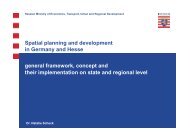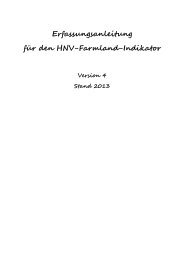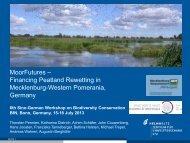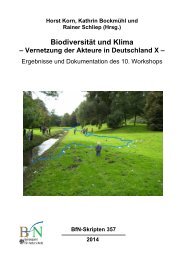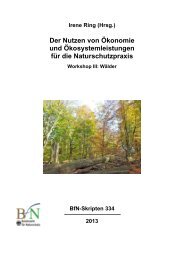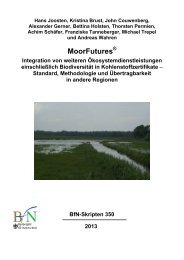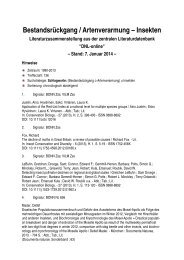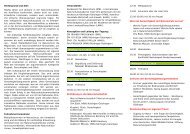Caring for Pollinators - Bundesamt für Naturschutz
Caring for Pollinators - Bundesamt für Naturschutz
Caring for Pollinators - Bundesamt für Naturschutz
Create successful ePaper yourself
Turn your PDF publications into a flip-book with our unique Google optimized e-Paper software.
Potts, Roberts, Kunin & Biesmeijer The status of European pollinators<br />
4.1 The status of European pollinators<br />
by Simon G. Potts, Stuart Roberts; William E. Kunin & Jacobus C. Biesmeijer, UK<br />
Importance of European pollinators<br />
It is estimated that more than 150 (84%) of European crops are directly dependent upon<br />
insects <strong>for</strong> their pollination (Williams 1994). Crop pollination is estimated to be worth €14.2<br />
billion per year in European Union (Gallai et al. 2008). European crops <strong>for</strong> which the number<br />
of fruits and seeds and their quality are dependent upon, or enhanced by, insect pollination<br />
(Corbet et al. 1991; Williams 1996) include:<br />
Fruits – apple, orange, tomato, pear, peach, melons, lemon, strawberry, raspberry, plum,<br />
apricot, cherry, kiwifruit, mango, currants, olives and grapevine; Vegetables – carrot, potato,<br />
onion, pepper, pumpkin, field bean, French bean, eggplant, squash, cucumber, and soy<br />
bean; Seeds and nuts – sunflower, almond, walnut and chestnut; Herbs – basil, sage,<br />
rosemary, thyme, coriander, cumin and dill; Industrial crops – cotton, oilseed rape, white<br />
mustard, and buckwheat; Fodder crops <strong>for</strong> animals – alfalfa, clover and sweetclover;<br />
Essential oils – chamomile, lavender, and evening primrose.<br />
To date there is a growing body of case studies and anecdotal evidence <strong>for</strong> declines in<br />
pollinators in Europe and elsewhere, however the in<strong>for</strong>mation is very fragmented and often<br />
reported outside the mainstream literature. Since many European crops depend on<br />
pollinators, and loss of pollination services may have huge negative impacts it is essential to<br />
understand the status and trends of Europe’s pollinators. The ALARM project (Assessing<br />
Large-scale threats <strong>for</strong> biodiversity with tested methods. www.alarmproject.net) undertook<br />
large scale studies of the trends in honeybees, solitary bees and hoverflies at the national<br />
and continental scales.<br />
94<br />
© IBRA





